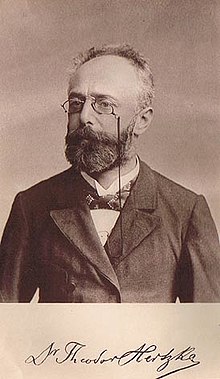Theodor Hertzka
Theodor Hertzka , also Hertzka Tivadar , (born July 13, 1845 in Pest , Austrian Empire , † October 22, 1924 in Wiesbaden ) was an Austrian economist , journalist and publicist .
Life
Theodor Hertzka came from a conservative Jewish family. After attending school in his hometown, he studied at the University of Vienna and later at the Loránd Eötvös University in Budapest . After successfully completing his studies, Hertzka got a job at the Neue Freie Presse in Vienna in 1872 , where he was responsible for the business section as editor.
In 1874 Hertzka founded the Society of Austrian Economists together with some like-minded people .
In 1879, Hertzka went into business for himself, founded the Wiener Allgemeine Zeitung and ran it as publisher until 1896. From this time came his friendship with Theodor Herzl , who worked for the Neue Freie Presse in Paris during these years .
After the First World War , Hertzka settled in Wiesbaden, where he died in 1924 at the age of almost 80.
National economy
In addition to his journalistic work, Hertzka made a name for himself through economic proposals and theories that seem utopian to his contemporaries, but from today's perspective (2006) quite realistic. In his work "Das Personenporto" he suggested z. B. propose to introduce a cheap uniform tariff for rail passenger transport.
Outdoors
His book “Freiland, ein Soziales Zukunftsbild” describes in the style of a report the utopia of a free-economic settlement cooperative in today's Kenya, based on detailed national economic considerations . The script found many followers. Franz Oppenheimer , Gustav Lilienthal and his brother Otto were among them. "Outdoor clubs" were formed in several countries. The projects that still exist today, the Eden orchard cooperative (1893) and the Freie Scholle housing cooperative (1895), were clearly influenced by the ideas of the book when they were founded. An attempt to implement it at the original location (Kenya) in February 1894 failed, however. In 1896 the book appeared in its tenth edition. The sequel Eine Reise nach Freiland deals, again in the form of a novel, with detailed questions (business start-ups, abuse and liability for loans). In the preface it says: “ First of all, the admission that this little book is a trend text in the worst sense of the word. Under the guise of entertainment and instruction, it aims to win the reader over not only to a certain opinion, but to certain actions. "
The open-air utopia is influenced by the views of Eugen Dühring , who sees interest on capital and rent as the evils of the existing economic system. Since Hertzka also based his theories on the work A Review from 2000 to 1887 by the American writer Edward Bellamy , contemporaries also called him the "Austrian Bellamy".
Fonts
- The shortcomings of the Austrian draft stock corporation law . Vienna 1875
- Currency and trade . Vienna 1876
- The laws of trade policy . Leipzig 1880
- The personal postage . Vienna 1885
- The laws of social development . Leipzig 1886
- The essence of money . Leipzig 1887
- Outdoors. A social picture of the future . 1890 summary and excerpts , English edition from 1891 in the Gutenberg project
- A trip to Freiland . Leipzig 1893
- Entranced into the future. A social picture of the future . Berlin 1895
- The Social Problem , 1912
literature
- Gerhard Stavenhagen: Hertzka, Theodor. In: New German Biography (NDB). Volume 8, Duncker & Humblot, Berlin 1969, ISBN 3-428-00189-3 , p. 718 f. ( Digitized version ).
- Hertzka Theodor. In: Austrian Biographical Lexicon 1815–1950 (ÖBL). Volume 2, Verlag der Österreichischen Akademie der Wissenschaften, Vienna 1959, p. 294.
Web links
- Literature by and about Theodor Hertzka in the catalog of the German National Library
- Works by and about Theodor Hertzka at Open Library
Individual evidence
- ^ Eugen Dühring: Cursus der National- und Sozialökonomie , Berlin 1873
| personal data | |
|---|---|
| SURNAME | Hertzka, Theodor |
| ALTERNATIVE NAMES | Hertzka, Tiavar |
| BRIEF DESCRIPTION | Austrian economist, writer and journalist |
| DATE OF BIRTH | July 13, 1845 |
| PLACE OF BIRTH | Plague (city) |
| DATE OF DEATH | October 22, 1924 |
| Place of death | Wiesbaden |

